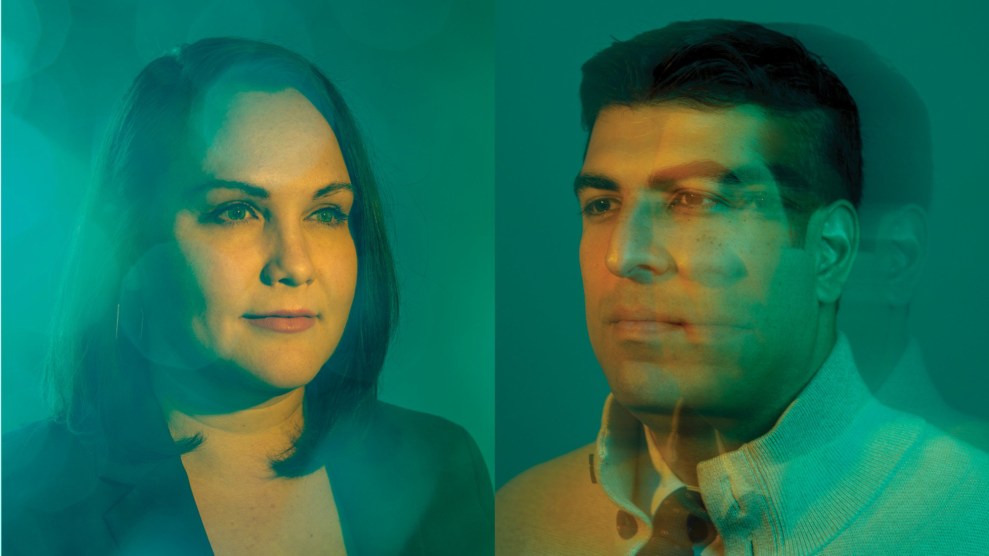
Mother Jones; Brian Cahn/Zuma; Stephanie Keith/Getty
Advice columnist E. Jean Carroll’s yearslong court battle to hold the man who sexually abused her legally accountable has been extraordinary in many ways. First, because that abuser is former President Donald Trump, who used all the power of his office, from the Secret Service to the Department of Justice, in various attempts to shrug off Carroll’s claim that he attacked her in a department store dressing room in the mid-90s and then defamed her by calling her a liar. Second, it’s unusual because the vast majority of survivors of sexual assault never report the violence they experience, much less trudge for years through a legal process that is famously hostile and marginalizing. And third, because Carroll won a civil case against Trump this May—becoming the only one, out of at least 26 women who have publicly accused him of sexual misconduct, to succeed in holding him liable for it.
But there’s one way in which Carroll’s case is not extraordinary: Her abuser is suing her for defamation. On Tuesday, Trump filed a counter-claim against Carroll, arguing that she smeared him when she went on TV after winning her sexual assault lawsuit and said that he had raped her.
Carroll is not alone in facing this kind of legal retaliation. In the years since the MeToo movement’s peak, individuals accused of sexual abuse and harassment have increasingly filed defamation lawsuits against the people who speak out against them. As I reported back in 2020, such lawsuits are seen by the accused as a way to clear their name, but they can also be used to punish survivors for breaking their silence.
The televised megatrial between actors Johnny Depp and Amber Heard last year was a high-profile example, but such cases also involve the non-famous. In my review of these lawsuits, some of the plaintiffs included an acroyoga instructor, an airport maintenance chief, a massage therapist, and a bar owner. One man whom prosecutors charged with sexually assaulting a woman in South Carolina filed a defamation lawsuit against her while his criminal case was still ongoing. The problem is especially acute for student survivors in both high school and college, who are commonly threatened with a defamation lawsuits after reporting sexual assault to school authorities; examples of these cases predate the MeToo era. As Maha Ibrahim, an attorney at Equal Rights Advocates, told me last year, “We represent the ordinary folks, and now they’re the ones getting threatened all the time.”
The consequence, Ibrahim said, is a chilling effect on survivors—even in the post-MeToo era: “It’s going to be so expensive and so traumatic to defend yourself, and it’s going to distract so much…that the tables are going to be completely turned. It’s not illogical for survivors to pause and say, ‘Is it worth it to come forward?’”
In Carroll’s case, Trump’s suit is a clear attempt to stop her from saying the word “rape.” It centers on the particulars of the jury’s verdict in the May case, in which jurors found him liable for sexual abuse, but not for rape. As my colleague Russ Choma, who attended the trial, explained in May:
While jurors didn’t find Trump liable for raping Carroll, the verdict was largely a vindication of her story. The jury had three options to choose from if they believed Trump committed battery: They could have found that Trump had raped her; that he had sexually abused her; or that he had forcibly touched her. By choosing the second option, the jurors apparently indicated they believed the bulk of Carroll’s story—that Trump pounced on her, threw her against the wall of a dressing room, forcibly kissed her, and shoved his hand up her dress and grabbed her genitals. Carroll said that Trump had also inserted his penis, but the jury evidently did not believe that Carroll’s attorneys had proved that allegation.
Of course, not being held liable for sexual violence isn’t the same as being exonerated of it. And laws drawing lines between different forms of sexual assault—such as what counts as “sexual abuse” as opposed to “rape”—are complicated and anatomically specific, though they all describe serious violations. Peer-reviewed research has found that such labels often don’t match the words survivors use to describe their own experiences. Carroll, for her part, has celebrated the jury’s verdict as a success. And when asked on CNN about what went through her mind when she learned the jury wasn’t holding Trump liable for rape, she answered, “Well, I just immediately say in my own head, ‘Oh yes you did, Oh yes you did.'”
Trump’s countersuit will play out alongside an older lawsuit Carroll filed against him when he was still president. That case is scheduled to go to trial in January, and it assesses whether the former president defamed Carroll when responding to her rape allegation.
The verdict against Trump in May was the result of a different case Carroll filed late last year, under a brand new New York state law that gives some survivors a temporary opportunity to sue people who sexually assaulted them. Under this law, Carroll could sue Trump directly for battery, even though the events in question happened decades ago.
So now Trump is suing Carroll for having the temerity to answer a question about her own experience listening to a verdict in a sexual assault trial that he lost, and for otherwise saying in public that he raped her. In a statement to reporters, Carroll’s lawyer, Rebecca Kaplan, said that Trump’s defamation lawsuit against Carroll “argues, contrary to both logic and fact, that he was exonerated by a jury that found that he sexually abused E. Jean Carroll by forcibly inserting his fingers into her vagina.”
“Trump’s filing is thus nothing more than his latest effort to delay accountability for what a jury has already found to be his defamation of E. Jean Carroll,” Kaplan said. “But whether he likes it or not, that accountability is coming very soon.”











